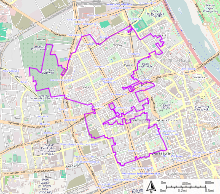Warsaw Ghetto
The Warsaw Ghetto was a large ghetto established by Nazi Germany during World War II. It was located in the city of Warsaw in the General Government. It is officially called the Jüdischer Wohnbezirk in Warschau (German for the Jewish Residential District in Warsaw) and the Warszawskie Getto (Polish for Warsaw Ghetto).


Many Jews died In the Warsaw Ghetto from systematic starvation, poverty, disease, freezing weather, and homelessness.
Size
changeIt was the largest ghetto established by the Nazis, covering c. 36590400 square feet (c. 1.3125 square miles). In total, about 460,000 Jews were forced to live there.
History
changeThe Warsaw Ghetto was established in October 1940.
Liquidation and uprising
changeThe ghetto is known for its heroic uprising in 1943. It was the largest single revolt by Jews during World War II.
The Nazis liquidated many ghettos between 22 June 1942 and 16 May 1943. "Liquidation" meant that all of the people living in the ghettos were killed or deported to concentration camps.
When the Nazis tried to liquidate the Warsaw ghetto, Jews fought back. The Nazis were trying to deport all of the people left in the ghetto to two death camps, Treblinka and Majdanek. The Jews refused to surrender. They fought the Nazis from 19 April to 16 May 1943, when they were finally defeated.
As a transit ghetto
changeIn October 1943 (or earlier), the Nazis started to use the Warsaw Ghetto as a transit ghetto for Jews being deported to concentration camps like Auschwitz. As of 31 March 1944, it still existed.
The ghetto's existence eventually some time in 1944 or 1945.